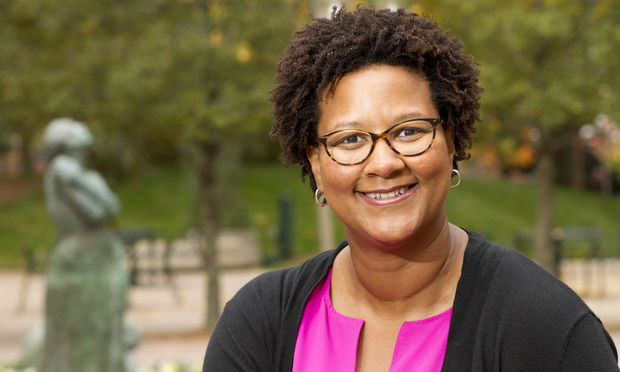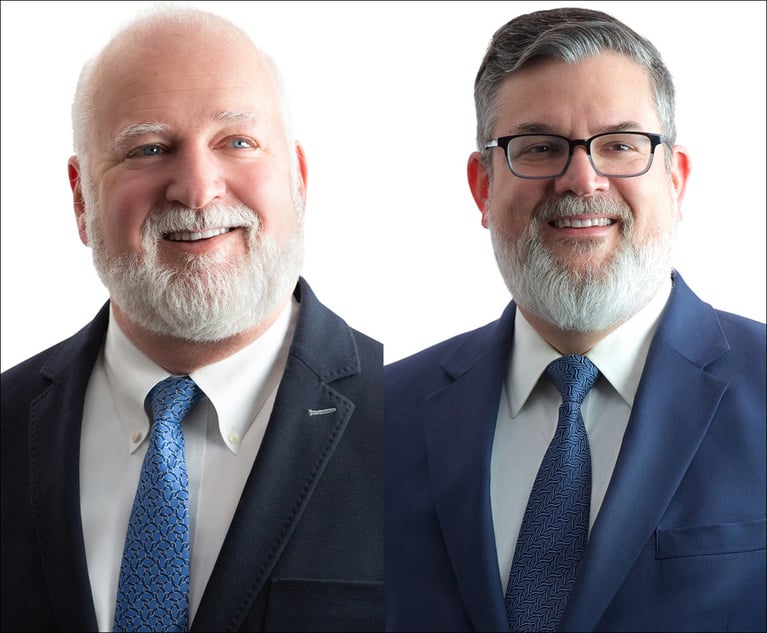Q&A: A Mid-Career Turn to Mediation and the Bench
Bianca Motley Broom gave up a steady paycheck as a trial lawyer at Allstate to pursue her long-held goal of becoming a mediator.
November 07, 2017 at 05:34 PM
7 minute read
 Bianca Broom, Miles Mediation, Atlanta.
Bianca Broom, Miles Mediation, Atlanta. After 14 years practicing law with the security of a regular paycheck, Bianca Motley Broom has taken the plunge and started a new chapter in her legal career as a mediator and part-time magistrate judge.
Broom quit her job as a senior trial attorney at Allstate Insurance Co. to take a part-time position as a Fulton County magistrate judge on June 30. In September she also landed a berth at one of Atlanta's largest alternative dispute resolution firms, Miles Mediation & Arbitration Services, where she is on David Nutter's team.
At 40, Broom is one of Miles Mediation's youngest neutrals—and its first African-American female, in a field where mediators at the larger firms skew older, white and male. A Daily Report survey of Georgia Neutrals found that 70 percent of the respondents were older than 51.
Mediation is often a second career for lawyers who've retired from law—but Broom didn't want to wait that long. She said she's always wanted to be a mediator because over her career as a litigator she's found mediation to be more effective than trial for resolving conflicts.
Still, it wasn't easy for Broom to give up the security of a paycheck—not to mention health insurance—and go out on her own. Both the magistrate judge and mediation work pay hourly fees.
Broom started out as an assistant prosecutor in Cuyahoga County, Ohio, the county seat for her hometown of Cleveland, before becoming a staff attorney for Allstate. She moved to Atlanta and worked for Hawkins Parnell Thackston & Young defending asbestos cases, then returned to Allstate as a senior trial attorney almost five years ago.
Her advice for other lawyers developing their own mediation practice is to “make the ask.”
In just four months, you've gone from being a full-time lawyer for Allstate to a part-time magistrate judge and a mediator. Why did you want to be a magistrate judge in the first place?
What I like about magistrate court is you're still dealing with average citizens. We handle small claims under $15,000, evictions, garnishments, traffic cases, warrant applications, environmental cases—we had a loose donkey in south Fulton recently—a huge range of things.
For many people, this is their window into the justice system. It may be the only time they've ever been in court. I want to make sure that they feel confident and comfortable throughout the litigation process. Even if they may not agree with what's happening—disagreement is fine—it is of paramount importance to me that they understand the process. I want to make it less mystifying for ordinary citizens.
How did becoming magistrate judge lead to mediation?
It gave me the confidence I needed to do something I'd wanted to do for a very long time—mediate. I had not been sure how to do it and keep the lights on. I thought it was a great match for the skills I've developed as an attorney and my natural inclination to connect with people. While I'm wearing different hats in different jobs, I want people to feel respected and heard.
I found in my practice that mediation is a really effective way to resolve cases—and without the uncertainty of a trial, where you're literally gambling. With a jury, you have no idea what they're going to fixate on. Why not avoid the risk and allow the plaintiff, who's probably been dealing with their situation for years, some closure instead of having their case decided by 12 strangers?
What kind of mediation are you doing?
Primarily personal injury. It plays to my strength of connecting with people. That's why I love being a judge in magistrate court—connecting with regular folks—and it's why I loved my job at Allstate. I met with insureds who'd never been sued and didn't know anything about the litigation process. I guided them through it during a very stressful time.
Typically in a trial, someone walks away unhappy. That's where a good mediator comes in. It doesn't take much skill to run numbers back and forth from room to room. It's important to understand what motivates people. It's not always money. Sometimes people are feeling ignored, disrespected or marginalized. A good mediator is going to pick up on that.
Why Miles? And how did you get the gig?
I'd done mediations at Miles and with other firms and solos while at Allstate—some court-ordered and some voluntary. When I decided I wanted to make the transition, it was my first choice. What Miles can give me as a mediator is exposure and the support of having this great pool of people to draw upon.
I reached out to a couple of neutrals there whom I'd mediated with, including David Nutter, asking for advice. We had breakfast, and I thought there's no better time than the present, so I asked him what I needed to do to get in at Miles. Soon after, he and [founder] John Miles invited me to join.
How are you building your mediation practice?
I got some excellent advice from Susan Forsling, another team leader at Miles. She said, “Make the ask. Once you start doing that it's a lot easier.”
I took all my LinkedIn contacts—I've got more than 800—and created an Excel spreadsheet. I took a day to prioritize them as high, medium or low for how they might be able to assist in networking, business development or directing mediation business my way—and I'm reaching out to people based on that. It's allowed me to get to know people I've had cases with a lot better. That's been great.
A lot of it is just saying to people, “This is what I'm doing now. I'd love to talk to you about it. Let's sit down for coffee or lunch.” I'm doing about five or six meetings a week. I want people to know I'm a resource for them. To be on their radar, they need to know I'm here in the first place.
Do you feel like a trailblazer as an African-American female in this field?
Mediation is still in its infancy relative to the practice of law. It's certainly taken a while for attorneys to reflect our greater community, so it's not surprising that mediation is still catching up.
How important is age and experience in being a mediator?
I talk to law students who want to mediate right out of the gate. If you don't understand how the practice works, that makes you less effective as a mediator. I've been practicing for 14 years. I've tried between 75 and 100 cases. I know the process.
There's something about turning 40. Our time here is finite, and I want to do what gives me fulfillment. It's a little bit scary at times, but I feel like I'm on my path—the intersection of the skills I've developed and the natural talent I have.
You have also become an accomplished potter. What got you into that?
[Laughs] That's my thing. Everybody needs a thing. I started doing it almost five years ago, after a friend asked me to take a class with her at Callanwolde [Fine Arts Center], and I haven't stopped since. It's so refreshing and fun—and supportive. My pottery “win,” when I make a great piece, doesn't detract from anyone else's.
This content has been archived. It is available through our partners, LexisNexis® and Bloomberg Law.
To view this content, please continue to their sites.
Not a Lexis Subscriber?
Subscribe Now
Not a Bloomberg Law Subscriber?
Subscribe Now
NOT FOR REPRINT
© 2025 ALM Global, LLC, All Rights Reserved. Request academic re-use from www.copyright.com. All other uses, submit a request to [email protected]. For more information visit Asset & Logo Licensing.
You Might Like
View All

Sunbelt Law Firms Experienced More Moderate Growth Last Year, Alongside Some Job Cuts and Less Merger Interest
4 minute read
Fowler White Burnett Opens Jacksonville Office Focused on Transportation Practice
3 minute read
Georgia High Court Clarifies Time Limit for Lawyers' Breach-of-Contract Claims
6 minute readTrending Stories
Who Got The Work
J. Brugh Lower of Gibbons has entered an appearance for industrial equipment supplier Devco Corporation in a pending trademark infringement lawsuit. The suit, accusing the defendant of selling knock-off Graco products, was filed Dec. 18 in New Jersey District Court by Rivkin Radler on behalf of Graco Inc. and Graco Minnesota. The case, assigned to U.S. District Judge Zahid N. Quraishi, is 3:24-cv-11294, Graco Inc. et al v. Devco Corporation.
Who Got The Work
Rebecca Maller-Stein and Kent A. Yalowitz of Arnold & Porter Kaye Scholer have entered their appearances for Hanaco Venture Capital and its executives, Lior Prosor and David Frankel, in a pending securities lawsuit. The action, filed on Dec. 24 in New York Southern District Court by Zell, Aron & Co. on behalf of Goldeneye Advisors, accuses the defendants of negligently and fraudulently managing the plaintiff's $1 million investment. The case, assigned to U.S. District Judge Vernon S. Broderick, is 1:24-cv-09918, Goldeneye Advisors, LLC v. Hanaco Venture Capital, Ltd. et al.
Who Got The Work
Attorneys from A&O Shearman has stepped in as defense counsel for Toronto-Dominion Bank and other defendants in a pending securities class action. The suit, filed Dec. 11 in New York Southern District Court by Bleichmar Fonti & Auld, accuses the defendants of concealing the bank's 'pervasive' deficiencies in regards to its compliance with the Bank Secrecy Act and the quality of its anti-money laundering controls. The case, assigned to U.S. District Judge Arun Subramanian, is 1:24-cv-09445, Gonzalez v. The Toronto-Dominion Bank et al.
Who Got The Work
Crown Castle International, a Pennsylvania company providing shared communications infrastructure, has turned to Luke D. Wolf of Gordon Rees Scully Mansukhani to fend off a pending breach-of-contract lawsuit. The court action, filed Nov. 25 in Michigan Eastern District Court by Hooper Hathaway PC on behalf of The Town Residences LLC, accuses Crown Castle of failing to transfer approximately $30,000 in utility payments from T-Mobile in breach of a roof-top lease and assignment agreement. The case, assigned to U.S. District Judge Susan K. Declercq, is 2:24-cv-13131, The Town Residences LLC v. T-Mobile US, Inc. et al.
Who Got The Work
Wilfred P. Coronato and Daniel M. Schwartz of McCarter & English have stepped in as defense counsel to Electrolux Home Products Inc. in a pending product liability lawsuit. The court action, filed Nov. 26 in New York Eastern District Court by Poulos Lopiccolo PC and Nagel Rice LLP on behalf of David Stern, alleges that the defendant's refrigerators’ drawers and shelving repeatedly break and fall apart within months after purchase. The case, assigned to U.S. District Judge Joan M. Azrack, is 2:24-cv-08204, Stern v. Electrolux Home Products, Inc.
Featured Firms
Law Offices of Gary Martin Hays & Associates, P.C.
(470) 294-1674
Law Offices of Mark E. Salomone
(857) 444-6468
Smith & Hassler
(713) 739-1250






